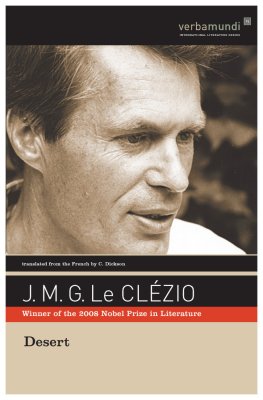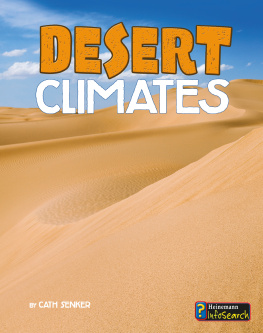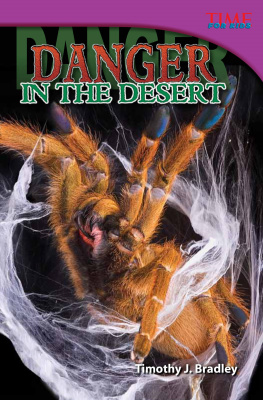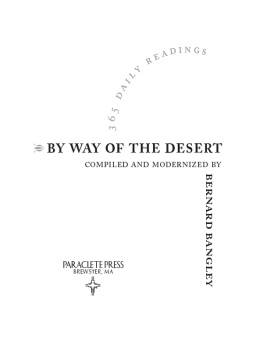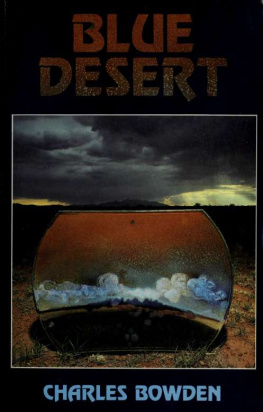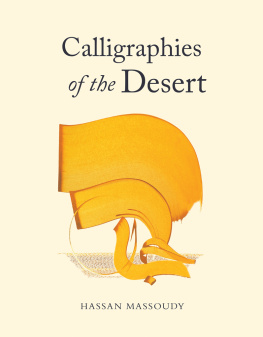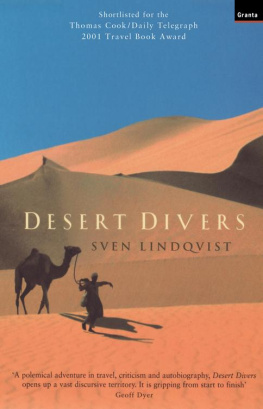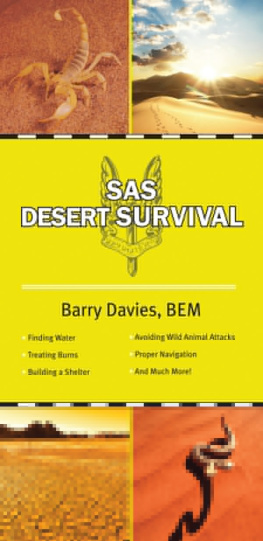J.M.G. LE CLZIO
DESERT
Translated from the French by C. Dickson
Saguiet al-Hamra, winter 1909-1910
THEY APPEARED as if in a dream at the top of the dune, half-hidden in the cloud of sand rising from their steps. Slowly, they made their way down into the valley, following the almost invisible trail. At the head of the caravan were the men, wrapped in their woolen cloaks, their faces masked by the blue veil. Two or three dromedaries walked with them, followed by the goats and sheep that the young boys prodded onward. The women brought up the rear. They were bulky shapes, lumbering under heavy cloaks, and the skin of their arms and foreheads looked even darker in the indigo cloth.
They walked noiselessly in the sand, slowly, not watching where they were going. The wind blew relentlessly, the desert wind, hot in the daytime, cold at night. The sand swirled about them, between the legs of the camels, lashing the faces of the women, who pulled the blue veils down over their eyes. The young children ran about, the babies cried, rolled up in the blue cloth on their mothers backs. The camels growled, sneezed. No one knew where the caravan was going.
The sun was still high in the stark sky, sounds and smells were swept away on the wind. Sweat trickled slowly down the faces of the travelers; the dark skin on their cheeks, on their arms and legs was tinted with indigo. The blue tattoos on the womens foreheads looked like shiny little beetles. Their black eyes, like drops of molten metal, hardly seeing the immense stretch of sand, searched for signs of the trail in the rolling dunes.
There was nothing else on earth, nothing, no one. They were born of the desert, they could follow no other path. They said nothing. Wanted nothing. The wind swept over them, through them, as if there were no one on the dunes. They had been walking since the very crack of dawn without stopping, thirst and weariness hung over them like a lead weight. Their cracked lips and tongues were hard and leathery. Hunger gnawed their insides. They couldnt have spoken. They had been as mute as the desert for so long, filled with the light of the sun burning down in the middle of the empty sky, and frozen with the night and its still stars.
They continued to make their slow way down the slope toward the valley bottom, zigzagging when loose sand shifted out from under their feet. The men chose where their feet would come down without looking. It was as if they were walking along invisible trails leading them out to the other end of solitude, to the night. Only one of them carried a gun, a flintlock rifle with a long barrel of blackened copper. He carried it on his chest, both arms folded tightly over it, the barrel pointing upward like a flagpole. His brothers walked alongside him, wrapped in their cloaks, bending slightly forward under the weight of their burdens. Beneath their cloaks, the blue clothing was in tatters, torn by thorns, worn by the sand. Behind the weary herd, Nour, the son of the man with the rifle, walked in front of his mother and sisters. His face was dark, sun-scorched, but his eyes shone and the light of his gaze was almost supernatural.
They were the men and the women of the sand, of the wind, of the light, of the night. They had appeared as if in a dream at the top of a dune, as if they were born of the cloudless sky and carried the harshness of space in their limbs. They bore with them hunger, the thirst of bleeding lips, the flintlike silence of the glinting sun, the cold nights, the glow of the Milky Way, the moon; accompanying them were their huge shadows at sunset, the waves of virgin sand over which their splayed feet trod, the inaccessible horizon. More than anything, they bore the light of their gaze shining so brightly in the whites of their eyes.
The herd of grayish-brown goats and sheep walked in front of the children. The beasts also moved forward not knowing where, their hooves following in ancient tracks. The sand whirled between their legs, stuck in their dirty coats. One man led the dromedaries simply with his voice, grumbling and spitting as they did. The hoarse sound of labored breathing caught in the wind, then suddenly disappeared in the hollows of the dunes to the south. But the wind, the dryness, the hunger, no longer mattered. The people and the herd moved slowly down toward the waterless, shadeless valley bottom.
Theyd left weeks, months ago, going from one well to another, crossing dried torrents lost in the sands, walking over plateaus, climbing rocky hills. The herd ate stubby grasses, thistles, euphorbia leaves, sharing them with the tribe. In the evening, when the sun was nearing the horizon and the shadows of the bushes grew inordinately long, the people and animals stopped walking. The men unloaded the camels, pitched the large tent of brown wool, standing on its single cedar wood pole. The women lit the fire, prepared the mashed millet, the sour milk, the butter, the dates. Night fell very quickly, the vast cold sky opened out over the dark earth. And then the stars appeared, thousands of stars stopped motionless in space. The man with the rifle who led the group called to Nour and showed him the tip of the Little Dipper, the lone star known as Cabri, and on the other side of the constellation, Kochab, the blue. To the east, he showed Nour the bridge where five stars shone: Alkad, Mizar, Alioth, Megrez, Fecda. In the far-eastern corner, barely above the ash-colored horizon, Orion had just appeared with Alnilam, leaning slightly to one side like the mast of a boat. He knew all the stars, he sometimes called them strange names, names that were like the beginning of a story. Then he showed Nour the route they would take the next day, as if the lights blinking on in the sky plotted the course that men must follow on earth. There were so many stars! The desert night was full of those sparks pulsing faintly as the wind came and went like a breath. It was a timeless land, removed from human history perhaps, a land where nothing else could come to be or die, as if it were already beyond other lands, at the pinnacle of earthly existence. The men often watched the stars, the vast white swath that is like a sandy bridge over the earth. They talked a little, smoking rolled kif leaves; they told each other stories of journeys, rumors of the war with the Christians, of reprisals. Then they listened to the night.
The flames of the twig fire danced under the copper teakettle, making a sound of sizzling water. On the other side of the brazier, the women were talking, and one was humming a tune for her baby who was falling asleep at her breast. The wild dogs yelped, and the echoes in the hollows of the dunes answered them, like other wild dogs. The smell of the livestock rose, mingled with the dampness of the gray sand, with the acrid odor of the smoke from the braziers.
Afterward, the women and children went to sleep in the tent, and the men lay down in their cloaks around the cold fire. They melted into the vast stretch of sand and rock invisible as the black sky sparkled ever more brilliantly.
Theyd been walking like that for months, years maybe. Theyd followed the routes of the sky between the waves of sand, the routes coming from the Dra, from Tamgrout, from the Erg Iguidi, or farther north the route of the At Atta, of the Gheris, coming from Tafilelt, that joins the great ksours in the foothills of the Atlas Mountains, or else the endless route that penetrates into the heart of the desert, beyond Hank, in the direction of the great city of Timbuktu. Some died along the way, others were born, were married. Animals died too, throats slit open to fertilize the entrails of the earth, or else stricken with the plague and left to rot on the hard ground.
It was as if there were no names here, as if there were no words. The desert cleansed everything in its wind, wiped everything away. The men had the freedom of the open spaces in their eyes, their skin was like metal. Sunlight blazed everywhere. The ochre, yellow, gray, white sand, the fine sand shifted, showing the direction of the wind. It covered all traces, all bones. It repelled light, drove away water, life, far from a center that no one could recognize. The men knew perfectly well that the desert wanted nothing to do with them: so they walked on without stopping, following the paths that other feet had already traveled in search of something else. As for water, it was in the aiun: the eyes that were the color of the sky, or else in the damp beds of old muddy streams. But it wasnt water for pleasure or for refreshment either. It was just a sweat mark on the surface of the desert, the meager gift of an arid God, the last shudder of life. Heavy water wrenched from the sand, dead water from crevices, alkaline water that caused colic, vomiting. They must walk even farther, bending slightly forward, in the direction the stars had indicated.

